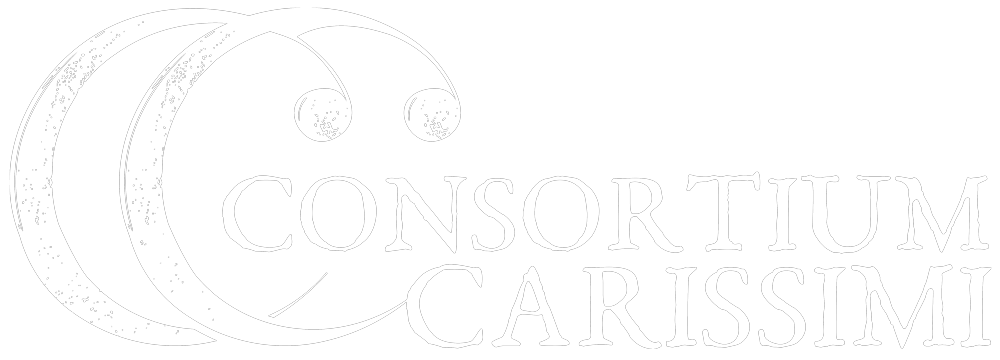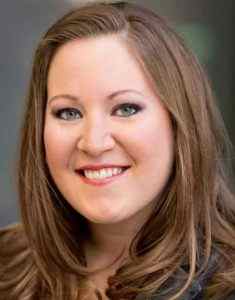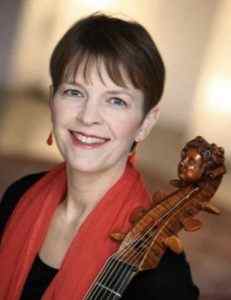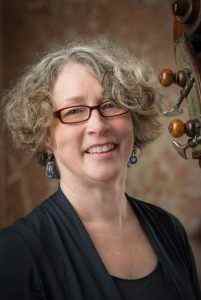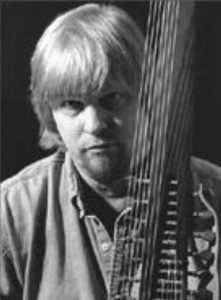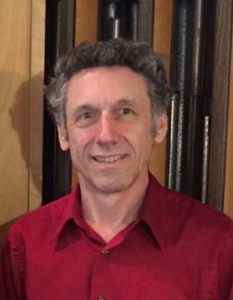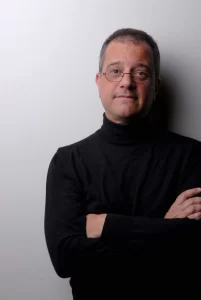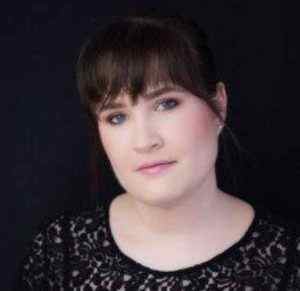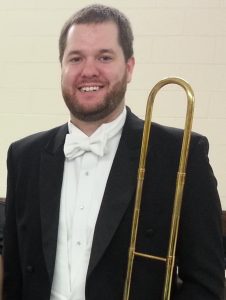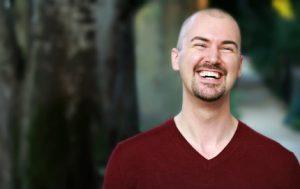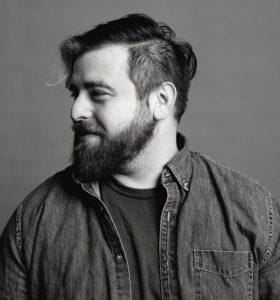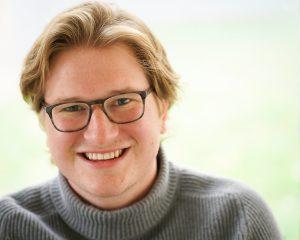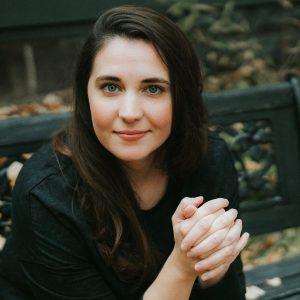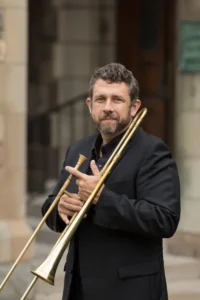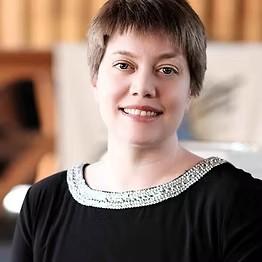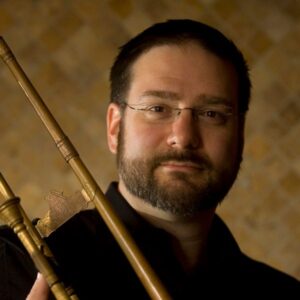About
Consortium Carissimi celebrates the 450th Anniversary of the birth of Claudio Monteverdi.
Vespro della Beata Vergine Maria – 1610
Consortium Carissimi was conceived of by Garrick Comeaux, Artistic Director, in 1996 while living in Rome, Italy. In 2007, Consortium Carissimi organized as an official 501(c)(3) nonprofit. This Minnesota-based performing ensemble has the mission of uncovering and bringing to 21st century audiences the long-forgotten Italian baroque music of the 16th and 17th centuries. It does so through live concerts, master classes, recordings and publications. Consortium Carissimi bears the name of the famous composer whose music was known for its simple, fresh approach to text, melody and accompaniment.
Much of the music that Consortium Carissimi performs has not been heard since it was first created in the 16th or 17th century—and it is only through the transcriptions of these original documents that this music may be heard today. The unique strength that Consortium Carissimi possesses is that it has in its library over 200 transcriptions of these long-forgotten works. Currently, there are no other organizations in the United States that have transcriptions such as these. As a result of this uniqueness, Consortium Carissimi contributes to the cultural vitality of the Minnesota community in four key and distinct ways:
- Performances: the ensemble of mixed voices and instruments performs at least three concerts annually of repertoire from the Italian-Roman sacred and secular music of the 16th and 17th centuries.
- Educational programs: Consortium Carissimi conducts master classes with educational institutions located in Minnesota and Tri-State area. Master classes include intense studies of vocal and instrumental practices of 16th and 17th century Rome.
- Manuscript transcription and publication: Consortium Carissimi is the only organization in the United States that has in its library transcriptions of over 200 manuscripts of this time period, including the complete works of Giacomo Carissimi.
- Recordings: Consortium Carissimi intends to extend public access to and knowledge of this musical tradition through digital recordings.
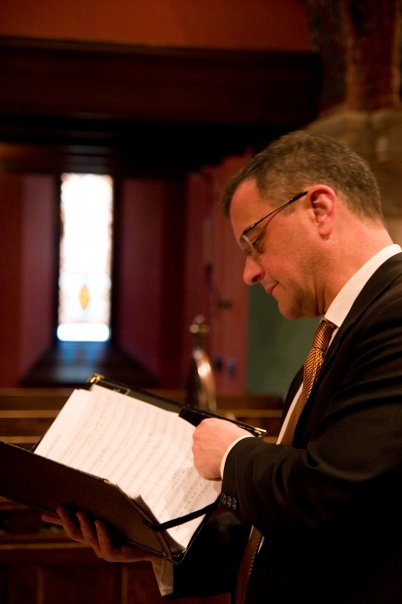
Founder & Artistic Director
Consortium Ensemble
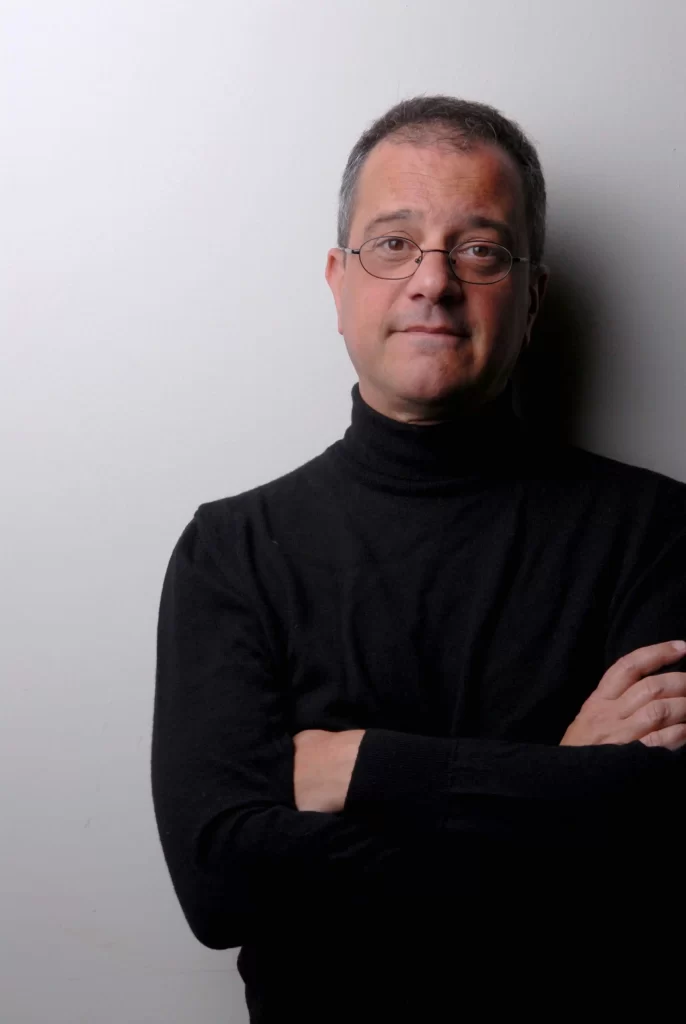
Garrick Comeaux, Artistic Director
Garrick returned to the United States in 2005 after 25 years of life in Italy and Germany, with extensive experience in early music, both as a singer and as a conductor. Following his musical formation at an early age in piano studies, bass viola and cello, as well as private voice lessons, Garrick attended Concordia College in Moorhead, Minnesota where he sang under the direction of Paul J. Christensen. He then dedicated his energies in vocal studies at Indiana University Music School in Bloomington.
Garrick moved to Rome, Italy in 1981 where his studies in voice continued at the Music Conservatories of Santa Cecilia in Rome and F. Morlacchi in Perugia, Italy. He soon took residence in Munich Germany in 1986, continuing vocal studies and performing as a member of the Bayerischer Rundfunk Konzertchor – Munich, Germany and also sang in concerts and recordings conducted by directors such as Sawalish, Solti, Maazel, Sinopoli, Barenboim and Bernstein. His keen interest in early baroque music began in the years spent in Germany, performing various works and oratories of Schütz, Buxtehude, Bach, Carissimi, Monteverdi and Purcell.
Garrick has worked extensively over the years with various early music groups, predominately in Italy but throughout the European continent. He has collaborated with ensembles and directors such as the Coro della Radiotelevisione Svizzera Italiana, Lugano, Switzerland, Diego Fasolis; L’Homme Armè, Fabio Lombardo and Andrew Lawrence King; Capella Ducale in Venetia, Livio Picotti; De Labytintho W. Testolin. In 1996, he founded the original Consortium Carissimi in Rome, Italy, with the aim of presenting – above all – the sacred and secular music of early Roman Baroque.
In addition to performing the works of Giacomo Carissimi, the Minnesota based ensemble also performs pieces by his contemporaries that, either because of similarity of style or because of their freshness and inventiveness, have often been mistaken for music by Carissimi, thus providing a clearer picture of the extraordinary effervescence that existed in the music world during the early Baroque period in Rome.
Consortium Carissimi Performers for Domenico Belli's Officium Defunctorum
Hailed for her artistry and rich mezzo color, Clara Osowski shares her musicianship equally between the opera stage and recital hall. She was a 2012 Metropolitan Opera National Council Upper-Midwest Regional Finalist and was named Runner-Up in the Schubert Club Bruce P. Carlson Competition. A sought after performer of art song, Ms. Osowski recently completed the Vancouver International Song Institute, and traveled to Tours, France, as the only American to attend the Académie Francis Poulenc with pianist Mark Bilyeu. The collaborative duo was one of ten duos recently selected to study at the Baldwin Wallace Art Song Festival with internationally renowned art song expert, Roger Vignoles. In addition to performing, Ms. Osowski is an Adjunct Faculty of Voice at the University of Minnesota-Morris and maintains a private voice studio in Minneapolis, Minnesota.
Julie Elhard, viola da gamba, appears regularly as a soloist and chamber musician and has made several appearances with the St. Paul Chamber Orchestra, including the St. Matthew Passion by Bach under the direction of Nicholas McGegan. She has been a guest artist with Apollo’s Fire in Cleveland and is a founding member of Violes Egales and Glorious Revolution Baroque. Ms. Elhard was awarded a 2011 Artist’s Initiative grant from the Minnesota State Arts Board and has also received a Jerome Foundation grant. Ms. Elhard received a Performing Artist Certificate from the Royal Conservatory of Music in The Hague, Netherlands and has taught at workshops in North America and at the Viola da Gamba Society of America’s national Conclaves. She currently teaches viola da gamba at St. Olaf College and Macalester College and is director of the early music programs at the St. Paul Conservatory of Music. She has recently published a new method for the viola da gamba including music for Renaissance Band.
Sara Thompson plays modern double bass, Baroque bass, and G violone. She studied at CSU with Dave Potter of the Denver Symphony before transferring to The Juilliard School where she earned her Bachelor’s and Master’s of Music as a student of Homer Mensch. For two years she was an Ear Training teaching fellow at Juilliard under Rebecca Scott. Further studies as a D.M.A student at Stony Brook University afforded her the remarkable opportunity to study with legendary chamber musician and bassist Julius Levine. Early music studies include classes and ensembles with Arthur Haas of Stony Brook, the Bach Ensemble Academy for Early Music in Italy, and lessons with bassist Michael Willens. Sara enjoys playing a wide variety of music and currently performs with the Lyra Baroque Orchestra, the Bach Society of Minnesota, and Consortium Carissimi. For five years she served on the Lyra Board of Directors. She has been on the faculty of The School for Strings, Hebrew Arts School, Juilliard Pre-College, and the MacPhail Center for Music.
Paul Berget received his B.F.A. degree from the University of Minnesota in 1972. After graduation, he continued his studies with the legendary Diana Poulton at the Royal College of Music in London, where he also studied with acclaimed lutenist Nigel North. In 1973, he appeared on Broadway in a musical production of Cyrano starring Christopher Plummer. In addition to playing early music, he has also performed in a variety of other musical styles: modern classical and steel string guitar, and world music. Recently he has been performing as the lutenist in the internationally acclaimed ensemble Minstrelsy!, a group that records on the Lyra Chord label. Other early music collaborations include the Rose Ensemble, Ensemble Polaris, the Minnesota Lute Quartet (MiLQ), and performances with the St. Paul Chamber Orchestra.
Bruce Jacobs, continuo organ and harpsichord, is heard frequently in the Twin Cities, having performed with the Waltham Abbey Singers, Ensemble Polaris, Bach Society of Minnesota, University of Minnesota ensembles, Lyra Baroque Orchestra, Elm Ensemble, Hymnus, Rose Ensemble, Consortium Carissimi, the National Lutheran Choir and the Fargo Moorhead Symphony. He was a founding member of Banchetto Musicale, the leading baroque ensemble in Fargo-Moorhead. Jacobs studied pipe organ performance with Ruth Berge at Concordia College in Moorhead and continuo through the Oberlin Baroque Performance Institute. He is Chief Technologist at Twin Cities Public Television.
Garrick Comeaux, Artistic Director of Consortium Carissimi, returned to the United States in 2005 after 25 years of life in Italy and Germany, with extensive experience in early music, both as a singer and as a conductor. Garrick began his musical formation at an early age in piano studies, bass viola and cello, as well as private voice lessons. Comeaux attended Concordia College in Moorhead, Minnesota and sang under the direction of Paul J. Christensen, then dedicated his energies in vocal studies at Indiana University Music School in Bloomington. Garrick moved to Rome, Italy in 1981 where his studies in voice continued at the Music Conservatories of Santa Cecilia in Rome and F. Morlacchi in Perugia, Italy. He soon took residence in Munich Germany in 1986, continuing vocal studies and performing as a member of the Bayerischer Rundfunk Konzertchor – Munich, Germany and also sang in concerts and recordings conducted by directors such as Sawalish, Solti, Maazel, Sinopoli, Barenboim and Bernstein. His keen interest in early baroque music began in the years spent in Germany, performing various works and oratories of Schütz, Buxtehude, Bach, Carissimi, Monteverdi and Purcell. Comeaux has worked extensively over the years with various early music groups, predominately in Italy but throughout the European continent. He has collaborated with ensembles and directors such as the Coro della Radiotelevisione Svizzera Italiana, Lugano, Switzerland, Diego Fasolis; L’Homme Armè, Fabio Lombardo and Andrew Lawrence King; Capella Ducale in Venetia, Livio Picotti; De Labytintho W. Testolin. In 1996, Comeaux founded the original Consortium Carissimi in Rome, Italy, with the aim of presenting – above all – the sacred and secular music of early Roman Baroque. The Minnesota based Consortium Carissimi was established in 2006. In addition to performing the works of Carissimi, the ensemble also performs pieces by his contemporaries that, either because of similarity of style or because of their freshness and inventiveness, have often been mistaken for music by Carissimi, thus providing a clearer picture of the extraordinary effervescence that existed in the music world during the early Baroque period in Rome.
Soprano Sophie Caplin, originally from Charlottesville, VA, obtained her Bachelor’s degree in Music/French from Duke University in 2018. She has performed as Oberto in Alcina with Chicago Summer Opera. Previous roles with UNCG Opera Theatre include Jenny Slade (Roman Fever), Dr. Blind (Die Fledermaus), Le Cercatrice (Suor Angelica) and La Ciesca (Gianni Schicchi). An avid chamber musician, Sophie has studied at CCM Baroque Collective, Oberlin Baroque Performance Institute, as well as Haymarket Opera Company. She won the Canadian Sinfonietta Young Artist Competition in Spring 2019 and was a finalist in the inaugural Camille Coloratura Awards in Fall of 2019.
Garrett Lahr is a freelance trombonist and early musician based in Minneapolis, Minnesota. Garrett is in demand across the country as a tenor and bass sackbut specialist; recent engagements include performances with Consortium Carissimi, Clarion Music Society (New York City), and Cambridge Concentus (Boston). Being equally comfortable in orchestral, jazz, and chamber music settings, he is also in demand as a modern bass trombonist. Recent engagements on bass trombone include regular concerts with the Nova Jazz Orchestra and Saint Paul Civic Symphony, as well as appearances with the Mankato Symphony Orchestra, Compass Rose Brass Ensemble, and Adam Meckler Orchestra, among others. Garrett holds bachelor’s degrees in Mechanical Engineering and Applied Mathematics from the University of Minnesota and University of Northwestern-Saint Paul, respectively. It was during his time at Northwestern that Garrett discovered his passion for music and his interest in historically informed performance. Garrett’s primary teacher on sackbut is Greg Ingles, with whom he continues to study.
Scott Brunscheen‘s “sweet and substantial lyric tenor” (Chicago Tribune) has garnered acclaim throughout the country in operatic and oratorio repertoire of the baroque, classical, and contemporary eras. A frequent guest soloist with Haymarket Opera, his recent performances there of Handel’s Il resurrezione, Caccini’s La liberazione di Ruggiero dall’isola d’Alcina, Haydn’s L’isola disabitata, Marais’ Ariane et Bachus, and Cesti’s L’Orontea received praise from Opera News, Chicago Tribune, Wall Street Journal, Chicago Classical Review, and many others. In spring of 2024, he made his Kennedy Center debut under the baton of Christophe Rousset in Mouret’s Les Fêtes de Thalie with Opera Lafayette. Other concert and operatic engagements have included the world premiere of Stewart Copeland’s The Invention of Morel at Chicago Opera Theater, Mozart’s Die Zauberflote with Madison Opera, Purcell’s The Fairy Queen at Long Beach Opera, Mozart’s Requiem with Chicago Chorale and Haydn’s The Creation at DuPage University. Outside of his work in opera, Scott has been the tenor soloist for Orff’s Carmina Burana, Handel’s The Messiah and Judas Maccabaeus, Pergolesi’s Magnificat, Bach’s Magnificat, Resphigi’s Lauda per la Nativita, Donizetti’s Miserere, Mendelssohn’s Elijah, Britten’s Serenade and Canticles, and cantatas of Bach, Buxtehude, and Rameau. He has been a finalist and prize winner in the Oratorio Society of New York, Handel Aria Competition, Grand Rapids Keller Bach Award, and American Prize in Opera.
Nicholas Landrum (he/him) creates beautiful music for complicated people. He is a classical post-minimalist composer, bass-baritone vocalist, electronic producer, multi-instrumental performer, and educator born in Philadelphia, and currently residing in Minneapolis. Nicholas has an affinity for the extremes. Inspired by dualities, finding solace in both science and religion, the organic and the unnatural, absolute art and intense narrative works. Nicholas has always been an extrovert, in love with the art of communication, with a deep need for human connection through art and everyday life. Much of his work focuses on influences from the profound, the use of generative mathematics, analog synthesis, and his first love, the human voice. In addition to his compositional career, and in the spirit of exploring dualities, Nicholas is both an avid church musician and pop artist, releasing the latter under the moniker “my idle little fingers”. In any given week, you can find him performing a basement show, an evensong, or lecturing at the Minnesota Orchestra.
Maxwell Trochlil earned his Bachelor of Music in vocal music education from Concordia College in Moorhead, MN, and a Master of Sacred Music in voice from the University of Notre Dame. He has dazzled audiences with solo performances in both opera and concert repertoire. Notable roles include Nero in Monteverdi’s L’incoronazione di Poppea, Miles in Missy Mazzoli’s Proving Up, and the disciple Simon in the world premiere of René Clausen’s The Passion of Jesus Christ. As a young artist, Trochlil sang as a member of the US Voces8 Scholars program. During his free time, Trochlil enjoys walks, going to the movie theater, and cheering on the Minnesota Timberwolves.
Erika Lantz, a 2024 McKnight Media Artist Fellowship Recipient, is a documentary artist and musician in Minneapolis. Her audio stories merge music and metaphor with investigative journalism to express things that are hard to say—whether because emotions have been too ineffable to articulate, or because very real forces and systems have coerced people into silence. Critics have lauded her “linguistic arabesques” and work that is at times “deliberately discombobulating, spinning and whirling as it feeds us provocative spoonfuls of setting and character.” She’s received Third Coast and National Edward R. Murrow awards. Her series THE TURNING was called the No. 1 Podcast of the Year by The Atlantic and was the first podcast ever to receive the Livingston Award for International Reporting.
Erik Schmalz, an early brass specialist, can be heard on numerous recordings, including a 2013 Grammy-nominated album by The Choir of Trinity Wall Street and The Trinity Baroque Orchestra. Erik works internationally with prestigious ensembles, including Tafelmusik, Ciaramella, Green Mountain Project, The Toronto Consort, and Dark Horse Consort, performing on period trombones, renaissance slide trumpet, and recorder. Erik received degrees in trombone performance from Oberlin Conservatory of Music and the University of Cincinnati College-Conservatory of Music. His musical and instrumental versatility also led him to be cast as one of the seven instrumentalists in the Globe Theatre’s Tony nominated production of Shakespeare on Broadway. He resides in Collinsville, Connecticut where he also teaches early and modern low brass privately.
Sister Stacie Lightner grew up on a farm outside Garden City, Kansas. She started piano lessons when she was five years old and organ lessons when she was eighteen. She earned bachelor’s degrees in organ performance and religious studies from The University of Kansas and then spent a year studying organ in Germany on a Fulbright Scholarship. She returned to KU to pursue a master’s degree in church music, followed by a doctor of music in organ performance at McGill University in Montreal. During her doctoral studies she developed a passion for hymnody and liturgy while simultaneously serving as the chapel organist at a Presbyterian seminary and singing in an Anglo-Catholic church choir that specialized in chant and Renaissance polyphony. In 2018, Sister Stacie was consecrated a Deacon in the ELCA. She is a member of the Deaconess Community of the ELCA and, therefore, uses the title “Sister.”
Greg Ingles attended high school at the Interlochen Arts Academy and went on to graduate from the Oberlin Conservatory. Two days after graduation he won the position of Solo Trombone in the Hofer Symphoniker in Hof, Germany. He returned to the United States and completed both a master’s and doctoral degree in trombone performance at SUNY Stony Brook. It was during his graduate work that Greg became acquainted with the sackbut and historical performance. Soon after beginning his early music studies Greg became a member of Piffaro, the Renaissance Band. He has since played with such ensembles as the American Bach Soloists, Chatham Baroque, Chiaroscuro, Concerto Palatino, Quicksilver, and Tafelmusik. Greg is also a member of Ciaramella and has recorded with this group on the Yarlung and Naxos record labels. He is Music Director of the Dark Horse Consort, an ensemble devoted to rarely performed brass music of the 17th century. Mr. Ingles has also recorded with Anakekta, Centaur, Dorian, Kleos, and reZound. Greg was the adjunct trombone professor at Hofstra University for over a decade.
Are you interested in volunteering as a Board Member or at one of our concerts?
We’d love to hear from you! Apply to volunteer and we’ll send you information on how to join us.
